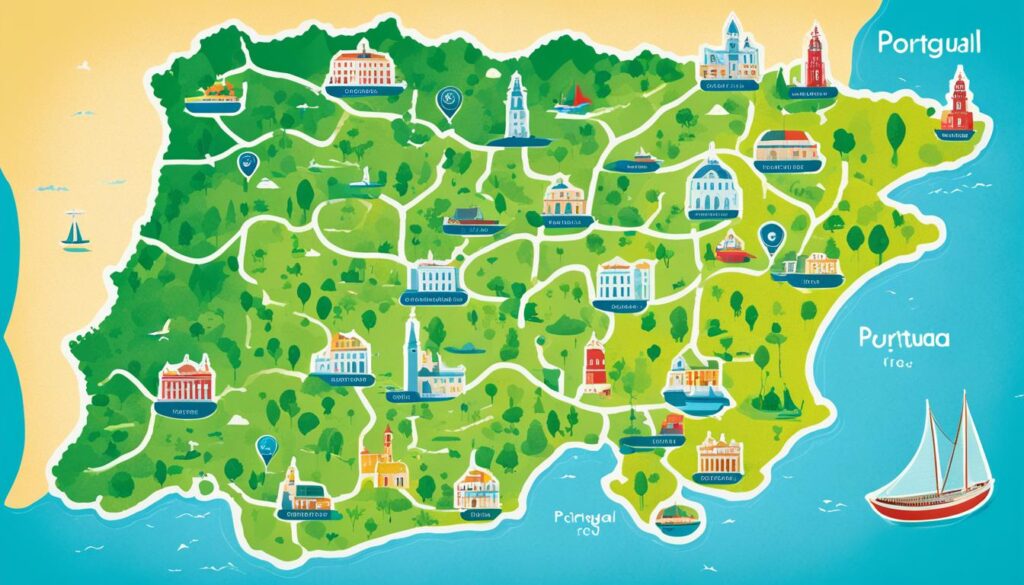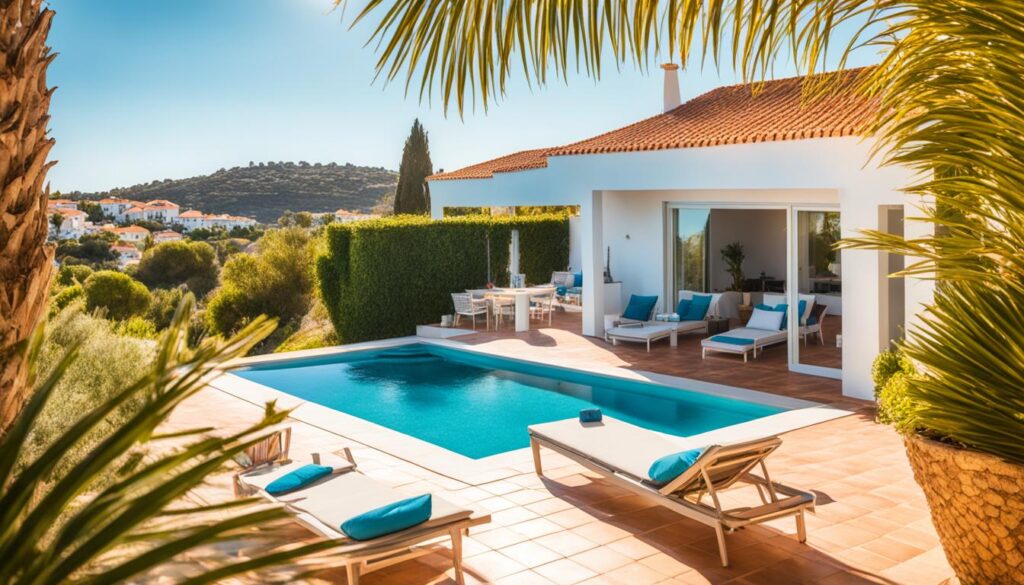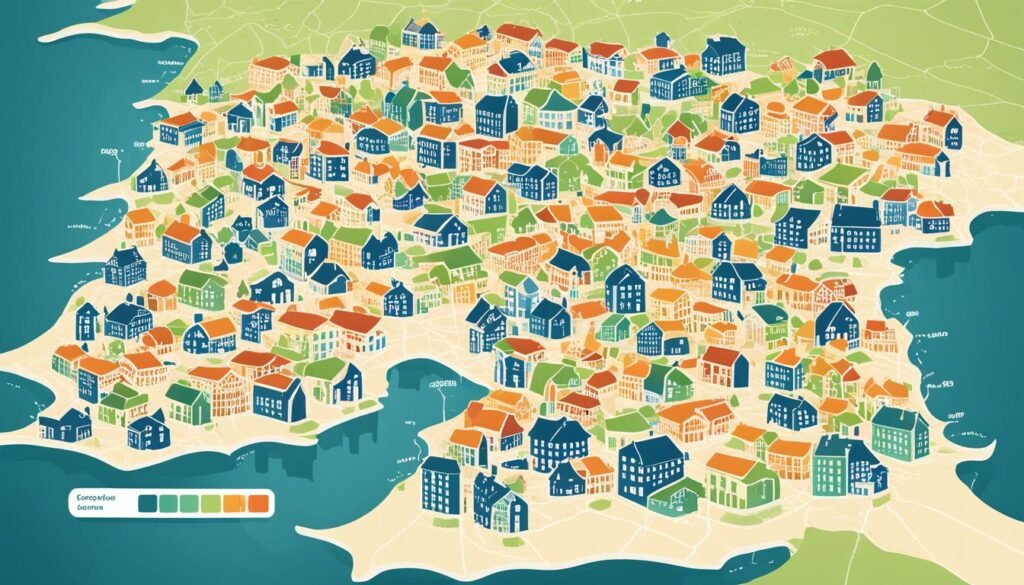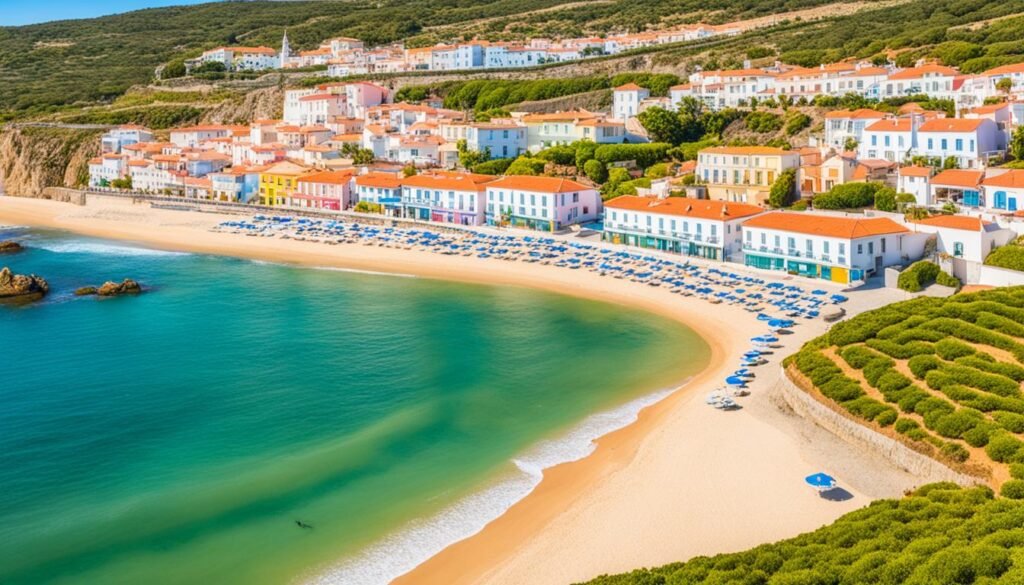Portugal is acclaimed for its alluring landscapes and warm Mediterranean charm, but acquiring real estate in Portugal as a non citizen goes beyond its picturesque views. The process of purchasing property in Portugal for foreigners is marked by legal frameworks and rights that are largely favorable, with no significant legal restrictions on foreigners buying property in Portugal. It’s pivotal to fathom the essence of Article 63 of the Treaty on the Functioning of the EU, which precludes any impediments to capital movements concerning non-residents and their property acquisitions1. Moreover, despite proposals like that of the Bloco de Esquerda seeking to restrict foreign property ownership to combat rising market prices, the current stance of the government reflects no intent to gatekeep the real estate sector from overseas investors1.
When it comes to Portugal property investment for foreigners, understanding the guidelines for non-EU citizens buying property in Portugal is crucial. As the market stands, the Portuguese government has adhered to a non-discriminatory policy, allowing equal opportunities for all, which underpins the solid relationship between Portugal and foreign investors who significantly contribute to the country’s real estate income1.
Key Takeaways:
- Foreigners have the right to buy property in Portugal under current laws.
- There are no overarching legal restrictions barring non-residents from property ownership.
- EU regulations support the free movement of capital for real estate purchases by non-resident citizens.
- Rising real estate prices have led to legislative proposals, but none that restrict foreign investment have been enacted.
- Foreign investment remains a cornerstone of Portugal’s real estate market.
Understanding the Portuguese Real Estate Market
The Portuguese real estate market has become a magnet for international buyers, owing to its vibrant culture, scenic landscapes, and competitive property prices. With an average reservation amount of around €5,000 for property in Portugal, the initial financial commitment remains accessible for many2. The non-habitual resident (NHR) scheme further catalyzes the appeal of the property market in Portugal, offering new residents significant tax benefits for up to ten years and encouraging a wave of property investment3.
When entering the real estate market in Portugal, investors should expect to contribute a down payment ranging from 10% to 30% of the property price in the preliminary contract, a common practice that safeguards both parties2. Lawyers and legal fees usually span from 1% to 1.5% (+VAT) of the property price — a necessary investment to navigate the legal intricacies of real estate investment in Portugal2. Notary fees and property insurance, which typically hover around 2% to 3% and up to 0.5% of the purchase price respectively, add to the upfront costs but ensure due diligence and protection of assets4.
The robustness of the housing market in Portugal is reflected in its steady price stability and high-quality property offerings2. The repayment period for mortgage loans can extend up to 30 years, with Portuguese banks often presenting the most favorable financing options for foreign investors2. Moreover, the legal transfer process completion typically ranges from 3 to 12 weeks post-preliminary contract, evidencing an efficient property conveyance system2.
A closer look at regional price disparities reveals that the per-sqm rates for housing in January 2024 contrast significantly, with Lisbon center at 5,516 €/m2 while the Faro district stands at a more modest 3,283 €/m24. These numbers place Portugal as the 19th most expensive country in Europe on the price per square meter index, presenting diverse investment opportunities across its regions4.
| Cost Component | Average Percentage of Property Price |
|---|---|
| Down Payment | 10% – 30% |
| Lawyer and Legal Fees | 1% – 1.5% (+VAT) |
| Notary Fees | 2% – 3% |
| Property Insurance | Up to 0.5% |
| Real Estate Agent Fees | 5% – 6% |
Real estate agent fees linger around 5% to 6% of the purchase price, justifying the value they bring with their market acumen and negotiation prowess4. The simplified tax system further eases the process, as taxes such as IMT are consistently based on the property’s purchase price, making it easier for buyers to anticipate costs4.
Within this attractive landscape, the real estate investment in Portugal thrives, buoyed by affordable property pricing as compared to Western European standards, and a lower cost of living particularly in metropolitan hubs like Lisbon and Porto, which rank more economically viable than their European counterparts3. The presence of important infrastructure, such as the three main airports, guarantees connectivity and sustained movement for residents and investors alike3. This potent combination solidifies Portugal’s position as a strategic, invigorating, and pragmatic locale for property investment on the global stage.
Can Foreigners Buy Property in Portugal?
Portugal’s allure as an investment haven for property has not waned, with many foreign buyers eyeing its sunny shores and historic cities. However, it is imperative to grasp the legal framework for foreigners buying property in Portugal before embarking on a real estate journey in this Iberian Peninsula country.
The Legal Framework for Foreign Buyers
Under the auspices of Article 63 of the Treaty on the Functioning of the EU, restrictions on capital movements, such as those related to acquiring real estate by non-resident citizens, are prohibited1. This EU-wide legislation ensures that foreigners have access to the Portuguese property market, bolstering the principle of free movement that the EU champions. Yet, there are discussions in regions such as the Balearic Islands and even within Portugal that seek to impose limitations on non-residents purchasing properties due to soaring real estate values1. The dynamics of such proposals are met with resistance from the sector, with professionals like Rafael Ascenso underlining the vital contribution of foreign investment to the market’s prosperity1.
Here’s a glance at the regulatory expenses that accompany property purchases in Portugal, which are part of the regulations for foreign property ownership in Portugal:
| Expense | Details | Impact on Buyer |
|---|---|---|
| IMT (Property Transfer Tax) | 0-8% of property price | Varies with property value5 |
| Notary Fees | €1,000-€2,000 | Essential legal cost5 |
| Stamp Duty | 0.8% of property price | Mandatory transaction cost5 |
Apart from understanding the costs, individuals interested in the Portugal Golden Visa program or assessing the eligibility criteria for foreign buyers in Portugal should be aware of the necessary fiscal obligations and prepare for a process that may take a few months to conclude5.
Impact of the Portugal Golden Visa Changes
Recent changes to the Portugal Golden Visa have sparked discussions on their potential impact on foreign property buyers. The program, which offers residency in Portugal for investments in real estate, has undergone modifications that could affect non-EU citizens looking to gain a foothold in the country1. It is crucial for potential buyers to keep abreast of the developments in this program as they could significantly shape their investment and residency strategies.
Moreover, the real estate industry cautions against restrictive measures that could hinder a market that significantly benefits from global investors1. Assessment of the impact of Golden Visa changes on foreign property buyers should involve considering the perspectives of numerous stakeholders, including policy-makers, real estate professionals, and economic analysts. These elements underscore the importance of thorough market research and professional advice for anyone looking to purchase property in Portugal.
Savvy investors recognize the need for due diligence and do not underestimate the power of legal and financial expertise when deliberating on property acquisition in foreign markets. Engaging with real estate agents and legal advisors early on can smooth the path to a successful transaction6.
In conclusion, while the doors to Portugal’s real estate market are wide open for foreign buyers, navigating the regulatory environment requires a keen understanding of current laws, tax implications, and professional support networks. By appreciating these factors, international investors can make strategic decisions that align with their goals and the nuances of the Portuguese property landscape.
Determining the Best Locations for Real Estate Investment in Portugal

Portugal’s dynamic real estate landscape offers a plethora of investment opportunities across its sun-kissed terrain. A critical mass of prospective property investors is often drawn to exploring the best locations for real estate investment in Portugal, igniting curiosity about where the perfect confluence of value, growth potential, and lifestyle aligns. Taking the pulse of the top cities for property investment in Portugal, one finds a vibrant array of options where culture, history, and economic vitality spill generously from every street corner.
With around three-quarters of Portugal’s population owning their homes7, the nation epitomizes a robust culture of property ownership. This statistic is intertwined with the fabric of the country’s popular areas for real estate investment7, areas which are magnified by Portugal’s reliably steady growth in property values – notably a 3.66% year-on-year rise7. Potential investors should also weigh the implications of securing loans at the historically low mortgage interest rates in Portugal, which had dipped to a record low of 1.2% in January 20167.
Diving deeper into financial realities, non-EU citizens eyeing the Portuguese market have the lure of the golden visa program to consider, offered to those purchasing property at a minimum value of €500,0007. This program has flourished, with thousands of golden visas and family residencies granted, signaling an unwavering interest in Portuguese soil7. Yet, pragmatism dictates awareness of the additional 6-8% allocation for property purchase fees8, a figure that encapsulates legal fees, notary costs, and procure taxes.
Moreover, the web of property listings across Portugal, stretched among reputable portals such as Idealista.pt and Casa.Sapo.pt8, offers a transparent window into available real estate. However, more clandestine avenues also exist, with some properties marketed exclusively through estate agents8. This duality in property listing mechanisms illustrates the diversity and richness of the market, ensuring that the best places to buy property in Portugal are both discoverable and varied in their presentation.
Assessing the terrain for the ideal investment site, focus naturally gravitates towards cities like Lisbon, Porto, and the sun-carressed Algarve region. These locales reflect the spirited nexus of tourism allure, economic advancement, and prolific rental demand – crucial factors for a sound property investment. Balancing this equation with the necessary financial foresight involves consideration of Portuguese banks’ expectations for a minimum deposit from newcomers, often hovering at 20%, alongside a navigable path of mortgage terms72.
Whether opting for modern apartments that punctuate Lisbon’s skyline or charming villas that dot the Algarve coast, the Portuguese property sphere beckons with promise and potential. It is an investment journey grounded in historical charm, buoyed by economic resilience, and marked by a profound appreciation for life’s finer moments. Anchored by solid economic indicators and clear incentives for international investors, Portugal stands as a bastion of real estate opportunity – a tapestry of locales primed for the astute buyer’s keen eye.
Property Types and Their Characteristics in Portugal

The allure of Portugal’s real estate market lies in its vibrant diversity, offering a spectrum of property types to suit various investment profiles. With a strategic approach informed by professional insight, investors can capitalize on unique opportunities within this dynamic market landscape.
Exploring Residential Options: From Urban to Rural
Portugal’s residential properties range from sleek urban apartments in the heart of Lisbon to tranquil rural villas that dot the rolling countryside of Alentejo. In the Lisbon Metropolitan Area, the average price per square meter is €3,469, demonstrating a bustling market ripe for investing in residential real estate in Portugal9. On the flip side, for those seeking serenity, the lower cost of €1,245/m2 in Alentejo can be an enticing investment, especially considering the reduced investment amounts required for properties in low-density areas under the Golden Visa Programme9.
Investing in Commercial Properties: What to Expect
Investing in commercial real estate in Portugal presents a diverse array of possibilities. From office spaces in urban areas to retail and hospitality venues in tourist hotspots like the Algarve, where the average price per m2 is €2,8449. The dynamic nature of the commercial sector, coupled with the country’s economic growth, presents attractive conditions for potential investors.
Furthermore, the Portuguese market has seen a significant uplift in housing prices, increasing by 13.8% in 2021, setting a positive trend for those looking to invest in the nation’s real estate9. In addition to the promising appreciation of property values, Portugal, noted for having some of the lowest housing costs per square meter in Western Europe, offers substantial financial incentives10.
When considering residential or commercial properties in Portugal, potential investors should account for additional costs such as the flat-rate stamp duty of 0.8% and notary and land registry fees which could range between 0.2% to 1.2%9. Moreover, the fiscal climate for mortgages is evolving, experienced by the average interest rate increase on new loans significantly tripling as reported in 202310.
| Property Type | Average Price per m2 | Notable Characteristics |
|---|---|---|
| Urban Residential | €3,469 (Lisbon) | High demand, strong rental markets |
| Rural Residential | €1,245 (Alentejo) | Tranquility, space, cultural heritage |
| Commercial (Algarve) | €2,844 | Tourism-driven, higher rental yields |
For those investing in commercial properties, the landscape is equally promising, with an observed trend of increasing prices and a high percentage of mortgages with variable interest rates910. Portugal’s housing market, having undergone a price boom, now offers both a wealth of residential options and robust commercial ventures10.
Whether it’s delving into the urban sanctuaries or harnessing the potential of flourishing tourist regions, Portugal’s property spectrum caters to discerning buyers and investors. With informed decisions and strategic planning, one can navigate the complexities of the market and embrace the very essence of profitable property investment.
Analyzing the Current Property Prices Across Portugal

The intricate tapestry of the Portuguese real estate market has revealed a rich pattern of price dynamics. In recent times, property prices in Portugal have reached record highs in several jurisdictions, underscoring the burgeoning demand and the country’s growing economic stature11. These escalating figures are testament to Portugal’s allure as a prime location for international and domestic investors alike.
Observing the housing prices in Portugal, a notable trend is the increasing synchronisation of prices across countries over the past decade11. This phenomenon speaks to the interconnected nature of today’s property markets, reflecting broader economic patterns and investment flows. Despite this synchronisation, each region in Portugal retains a distinct price trajectory dictated by local factors, illustrating that while the global real estate narrative has common threads, the story in Portugal is uniquely its own.
The real estate prices in Portugal, both residential and commercial, have felt the influence of international investors, who have been increasing their presence in local markets11. Spurred by Portugal’s economic stability and growth prospects, these investors have contributed to the vibrant dynamics of the property scene.
An analysis of the property market trends in Portugal indicates that house prices are often a function of broader economic indicators such as higher disposable income, population growth, and lower interest rates, which have recently boosted the market11. Meanwhile, the commercial real estate segment tends to hitch its fortunes to GDP growth trends, reacting inversely to fluctuations in interest rates and the lure of alternative investment returns11.
What stands out in the price analysis of the Portuguese real estate market is the inherent heterogeneity, despite higher synchronisation in property prices11. It pinpoints the need for in-depth regional analyses to understand the nuances of each local market.
| Region | Average Residential Price (€/m²) | Average Commercial Price (€/m²) | Annual Growth Rate | International Investor Share |
|---|---|---|---|---|
| Lisbon | 3,500 | 5,200 | 6.5% | 28% |
| Porto | 2,900 | 4,150 | 5.9% | 21% |
| Algarve | 2,600 | 3,800 | 4.7% | 34% |
| Coimbra | 1,800 | 2,500 | 3.1% | 12% |
| Madeira | 2,100 | 3,000 | 5.2% | 18% |
To further elaborate, the real estate market in Portugal has also been shaped by macroprudential policies aimed at addressing imbalances and enhancing the stability of both commercial and residential sectors11. These measures, alongside fiscal approaches like stamp duties, have been instrumental in moderating the pace at which international investors alter the landscape11. Yet, despite these interventions, the impact of foreign investment on local markets, especially in the realms of residential property in countries like Canada and Spain, denotes a growing footprint that aligns positively with price growth11.
As we consider the future of property investment in Portugal, the efficaciousness of current tools designed to manage the risks innate to increased international investor participation remains a subject of great contemplation and discourse11. The Portuguese property scene, imbued with potential, continues to evolve under the watchful eyes of observers, weighing each metric and trend to discern the pathways for sustainable growth and investment precision.
“Can foreigners buy property in Portugal”

The prospect of purchasing property in Portugal as a non-citizen is met with encouraging signs, backed by firm legal frameworks within the European Union. The European Commission asserts that unless there are compelling reasons of public interest, EU Member States shouldn’t restrict property ownership for non-residents, including real estate investments such as housing1. One would interpret this as a favorable nod towards those inquiring, “Can foreigners buy property in Portugal?” Indeed, Article 63 of the Treaty on the Functioning of the EU advocates for the unhindered movement of capital, particularly relating to real estate acquisitions by non-resident citizens, further cementing this right1.
Moreover, recent debates in the Balearic Islands regarding potential restrictions on foreign buyers purchasing homes illustrate a broader dialogue within the region1. However, Portugal’s current stance doesn’t align with such restrictions— a fact mirrored by the government’s absence of plans to act on a bill proposed by the Bloco de Esquerda (BE), which aimed to limit real estate sales to overseas buyers1. This could be, in part, due to the valuable contribution foreign investment has delivered to the local real estate industry, as indicated by the CEO of Porta da Frente—a sentiment that embodies the economic underpinning favoring property ownership for non-residents in Portugal1.
- The European Commission and EU laws support the right to property ownership in EU member states, denoting no direct barrierss for non-citizens1.
- Portugal, embodying these regulations, showcases an open real estate market to potential foreign investors1.
The discourse surrounding regulation changes is an ongoing one, yet as of now, the data and statements issued by real estate experts underline the continued openness of Portugal’s property market to international buyers. This inclusivity ensures that purchasing property in Portugal as a non-citizen is not only possible but has been a substantial driving force in the market.
The notion of an open market is integral to Portugal’s economic landscape, with foreign investments playing a pivotal role. Such contributions are critical to the vibrancy and resilience of Portugal’s real estate sector—hence the current permissiveness towards foreign buyers prevails.
As matters stand, the answer to “Can foreigners buy property in Portugal?” remains a comprehensive yes. This position sustains a gateway for non-residents to participate in and contribute to the dynamic property market of this alluring European nation.
Advantages and Challenges of Buying Property in Portugal

Portugal, with its captivating landscapes and amenable climate, continues to lure international investors looking for valuable real estate opportunities. Benefits of investing in Portuguese real estate are multi-fold, ranging from potential rental yields to a lifestyle that is considered one of Europe’s best. Undoubtedly, the advantages of buying property in Portugal can be significant, as a remarkable three-quarters of local residents own their homes7. Portugal’s golden visa further sweetens the deal, offering non-EU citizens a 5-year residency permit upon a minimum property investment, which underscores the country’s openness and the government’s encouragement of foreign investment7.
Why Portugal’s Real Estate Appeals to International Investors
One of the compelling reasons for this interest in Portuguese properties is the steady appreciation observed in the market. Property prices in Portugal witnessed a year-on-year increase of 3.66% in January 2016, noting an average cost of €1,047 per square meter, reflecting a promising trend for investors seeking capital gains7. Additionally, with record low-interest rates on mortgages dipping to a mere 1.2% in January 2016, the financial climate has been considerably favorable for those looking to finance their property purchases through loans7.
Navigating Bureaucracy: Tips for a Smooth Purchase
However, the process is not without its challenges of buying property in Portugal. Prospective buyers, especially from overseas, often find themselves grappling with elaborate bureaucracy. Knowledge of the local language and legal procedures is essential in navigating bureaucracy in Portugal, ensuring adherence to the due process. For a smooth property purchase in Portugal, it’s advisable to work with reputable lawyers and real estate agents who provide guidance through the intricate maze of paperwork and legal requirements. They can assist with understanding the most significant costs, such as the property transfer tax (IMT), among other additional financial obligations including stamp duty, notary, land registry fees, lawyers’ fees, and Portuguese mortgage fees7.
Banks in Portugal, catering to the financing needs during the property transaction, may require a substantial minimum deposit of 20%, particularly for newcomers to the country7. Although major lenders in Portugal are still offering mortgages, applicants should be aware of the shrinking market over the last half-decade7. With proper planning and expert advice, investors can adeptly handle these financial nuances.
| Year | Average Property Price (€/m^2) | Mortgage Interest Rate | Housing Loan Change % |
|---|---|---|---|
| 2016 | 1,047 | 1.2% | -3.8% |
Embracing the full spectrum of advantages and challenges presents a clearer picture for those intrigued by the prospects of investing in this dynamic and inviting market. With thoughtful preparation and strategic guidance, the journey towards property ownership in Portugal can be as rewarding as the destination itself.
The Role of Real Estate Agents in the Portuguese Market

Navigating the myriad intricacies of the Portuguese property landscape, particularly for those not well-versed in local customs and regulations, can pose quite the challenge. This is where the role of real estate agents in Portugal becomes indispensable, offering guidance through a complex maze of bureaucratic requirements and market nuances. From the sprawling, historic streets of Lisbon to the sun-soaked Algarve coastline, a trusted real estate agent becomes a conduit to a successful property transaction.
These professionals offer a suite of services: extensive property searches, adept negotiation skills, and adept legal support. Most importantly, perhaps, are their roles in managing taxation requirements, such as the Municipal Property Transfer Tax (IMT), which varies based on several factors including property value and exemptions available12. Stamp duty at a rate of 0.8%, both on acquisitions and during deed signing, is another key area where real estate agents provide invaluable assistance1213. Legal authorization and licensing granted by the “Instituto da Construcao e do Imobiliario” ensure that the estate agents are qualified and approved13.
By hiring a real estate agent in Portugal, buyers are often able to better navigate the local municipal property taxes (IMI), which fluctuate based on municipality12. Additionally, the intricacies involved in capital gains — from taxation on property sales to exemptions under specific conditions — are demystified with expert guidance1213. It’s clear that the benefits of using a real estate agent in Portugal extend beyond the mere convenience of having a knowledgeable partner; they help with securing fiscal benefits and adhering to regulations, ensuring a smooth and compliant transaction.
The right real estate agent serves as more than just a mediator — they become the client’s personal advocate in realizing their investment goals. For non-residents venturing into the Portuguese market, learning that credit loans can cover up to 75% of a property’s total price, and that mortgage options exist up to 65–75% of the property value, is crucial information only enhanced by an agent’s informed perspective13.
A good real estate agent in Portugal will ensure proper adherence to the principle of priority rights in the Portuguese Land Registry, which can be particularly crucial when multiple claims over a property emerge13. Furthermore, they will ensure all prerequisites, such as obtaining a Portuguese tax number and preparing payment stamps, are met for a legally sound sale-purchase contract13. Critically, they uphold the public’s right to access property records, demystifying ownership histories and providing potential buyers with the clarity needed to make informed choices.
| Tax/Fee | Description | Benefit with Real Estate Agent |
|---|---|---|
| IMT (Property Purchase Tax) | Varies from 0-8%, based on property value | Agents help in navigating exemptions and assessing applicable rates |
| Stamp Duty | Levied at 0.8% of property value | Calculation and timely payment facilitated by agent |
| IMI (Municipal Property Tax) | Varies by municipality for urban and rural buildings | Agent provides guidance on local rates and payment |
| Capital Gains Tax | Taxed on sale, residents pay 50%, non-residents 28% | Insights on exemptions and tax planning |
It’s evident that professional real estate agents play a pivotal role in simplifying the complexities of the Portuguese property market for buyers, especially those unfamiliar with local protocols. With their profound understanding of taxation, legal processes, and market dynamics, agents ensure that buyers enjoy a seamless and efficient property-buying experience.
Financing Your Property Purchase in Portugal
Embarking on the journey of financing property purchase in Portugal introduces a myriad of options, particularly intriguing for investors and future residents alike. Statistical data indicate a robust engagement with the property market, with foreigners spending more than double on properties compared to Portuguese nationals in the last quarter of 202114. This trend showcases a growing international recognition of the value and potential that Portuguese real estate holds.
Understanding the mortgage process in Portugal is essential for anyone looking to secure financing for their property venture. Currently, about 78% of Portuguese residents own their property, surpassing the EU average of 70%14. Among them, 38% have a mortgage, which is notably higher than the EU average of 27%14. This suggests a well-established system in place, benefiting from competitive mortgage options for foreigners in Portugal.
Factors such as the recent rise in mortgage lending in Portugal, with balances reaching 99 billion in 202214, reflect the health of the market and the availability of funding. Interest rates are equally crucial, varying from as low as 1% to as much as 8%14, influenced by individual circumstances such as financial history and property value.
It is interesting to note that while residents can often borrow up to 80-90% of the property value, non-resident borrowing is usually capped at 60-70%14. This differentiation underscores the importance of understanding your standing as a foreigner seeking a mortgage in Portugal.
Making a commitment to a mortgage also implies adherence to specific financial constraints; borrowers must ensure that the sum of their monthly repayments and ongoing debts does not exceed 30-35% of their net monthly income14. This is a crucial aspect of the mortgage process in Portugal, guaranteeing that the financial commitment remains sustainable over time.
When exploring the mortgage options for foreigners in Portugal, it is also vital to familiarize oneself with the usual mortgage terms in Portugal. They typically span 25 years, with possible extensions to 30 years depending on personal circumstances, and lay down the expectation of full repayment by the age of 70, 75, or 8014.
With 41% of Portuguese residents owning their homes outright and the expanding profile of mortgage lending14, Portugal stands as a beneficent landscape for potential investors and homeowners, offering an inviting blend of opportunity and financial flexibility.
In conclusion, getting a mortgage in Portugal opens doors not only to property ownership but also to joining a community prospering within a stable and adaptive financial system. Whether a resident or an expatriate, the harmonious landscape of Portuguese real estate financing awaits your participation.
Understanding Taxes and Fees in the Portuguese Property Market
Delving into the Portuguese property market reveals a landscape where financial due diligence is key. Foremost, investors should be acquainted with the property purchase tax, fluctuating between 6-9% of the property’s cost—a critical facet of the closing costs in Portuguese real estate transactions15. Furthermore, the stamp duty stands at 0.8% of the property price15, serving as another piece of the fiscal puzzle that buyers must navigate. It’s a financial environment where understanding nuances, such as the Non-Habitual Tax Resident Portugal regime, can translate into substantial savings for those settling in the country.
For those venturing into the rental market, it’s crucial to comprehend the varied taxation rates based on property type and residency status. Non-resident investors can expect to pay rental income tax at 8.75% for short-stay villas15, but only 3.75% if they’re running a hotel business in Portugal15. Such fiscal intricacies, including the 25% tax rate for landlords in Category F rental income that’s applied to non-residents15, must be part of an investor’s strategy to ensure profitability and adherence to the taxes and fees in the Portuguese property market.
Critical to the economic equation is the capital gains tax in Portugal, charged at 28% of the gain for non-resident investors15, while inheritance tax is laid at a 10% stamp duty on the property value, from which spouses and children are exempt15. Such figures underscore the importance of meticulous financial planning when dealing with property taxes in Portugal and highlight the value of comprehensive tax advice. By acclimating to these fiscal realities, investors can optimally structure their property investment to suit both their financial and lifestyle aspirations in Portugal.
FAQ
Can foreigners buy property in Portugal?
Yes, foreigners can buy property in Portugal without any restrictions.
What is the legal framework for foreign buyers in Portugal?
The Portuguese government does not impose any restrictions on foreigners buying property in the country. Non-residents have the same rights as Portuguese citizens when it comes to property ownership.
What are the recent changes to the Portugal Golden Visa program?
The Portugal Golden Visa program underwent some changes that may impact foreign property buyers. It is essential to stay up-to-date with the latest regulations and requirements.
What are the best locations for real estate investment in Portugal?
Portugal offers attractive real estate investment opportunities in various cities and regions. It’s crucial to consider factors such as economic growth, rental demand, tourism appeal, and infrastructure development when identifying the best locations.
What are the different property types available in Portugal?
Portugal offers a diverse range of property types, including residential options such as urban apartments and rural villas, as well as commercial properties like office spaces, retail outlets, and hospitality venues.
What are the current property prices across Portugal?
Property prices in Portugal vary depending on the region and type of property. It is advisable to analyze the current market trends and consider factors such as average price per square meter to make informed investment decisions.
Can non-residents buy property in Portugal?
Yes, non-residents have the same rights as Portuguese citizens when it comes to buying property in Portugal.
What are the advantages and challenges of buying property in Portugal?
Buying property in Portugal offers advantages such as attractive investment opportunities, a high quality of life, and a stable economic environment. However, challenges can include navigating bureaucratic processes and ensuring a smooth purchase.
What is the role of real estate agents in the Portuguese market?
Real estate agents play a crucial role in the Portuguese market, providing services such as property search, negotiation assistance, and legal guidance. Hiring a qualified agent can help navigate the complexities of the property acquisition process.
What are the options for financing a property purchase in Portugal?
Financing options for property purchases in Portugal include mortgages for foreigners. Understanding the mortgage process, eligibility criteria, and steps involved can help plan for property financing.
What taxes and fees are associated with property ownership in Portugal?
Property ownership in Portugal comes with taxes such as annual property tax and capital gains tax, as well as fees including stamp duty and closing costs. It’s important to understand the tax and fee structure to plan your budget effectively.
Source Links
- https://www.theportugalnews.com/news/2023-04-01/banning-foreigners-from-buying-houses/76230
- https://www.tagusproperty.com/portugal-real-estate-buying-guide/
- https://www.propertyguides.com/portugal/buying/
- https://www.pearlsofportugal.com/useful-information/buying-a-property/
- https://www.aer-oman.org/buying-property-portugal/
- https://www.idealista.pt/en/news/financial-advice-in-portugal/2024/02/14/5866-how-to-get-a-mortgage-in-portugal-as-a-foreigner
- https://www.expatica.com/pt/housing/buying/buying-property-in-portugal-105551/
- https://www.linkedin.com/pulse/how-buy-property-portugal-step-by-step-guide-kamila-laura-sitwell-
- https://www.endevio.org/en/insights/buy-a-property-in-portugal-and-get-residency
- https://www.kredium.com/en/blog/getting-a-mortgage-in-portugal-as-a-foreigner
- https://www.bis.org/publ/cgfs64.pdf
- https://eportugal.gov.pt/en/cidadaos-europeus-viajar-viver-e-fazer-negocios-em-portugal/viver-em-portugal/compra-e-venda-de-imoveis-em-portugal-cidadaos-europeus-
- https://www.lawyers-portugal.com/purchase-a-property-in-portugal
- https://www.expatica.com/pt/housing/buying/mortgages-in-portugal-758275/
- https://www.propertylisbon.com/property-rental-income-tax-in-portugal/
Comments